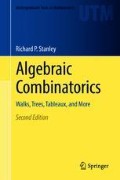Abstract
In this chapter we will discuss a profound connection between commutative rings and some combinatorial properties of simplicial complexes. The deepest and most interesting results in this area require a background in algebraic topology and homological algebra beyond the scope of this book.
Access this chapter
Tax calculation will be finalised at checkout
Purchases are for personal use only
Notes
- 1.
Since we have (x − 1)0 = 1 in the term indexed by i = d on the left-hand side of (12.5), we need to interpret 00 = 1 when we set x = 1. Although 00 is an indeterminate form in calculus, in combinatorics it usually makes sense to set 00 = 1.
References
H. Bruggesser, P. Mani, Shellable decompositions of cells and spheres. Math. Scand. 29, 197–205 (1971)
W. Bruns, J. Herzog, Cohen-Macaulay Rings, revised edn. Cambridge Studies in Advanced Mathematics, vol. 39 (Cambridge University Press, Cambridge/New York, 1998)
G.F. Clements, B. Lindström, A generalization of a combinatorial theorem due to Macaulay. J. Comb. Theory 7, 230–238 (1969)
I.S. Cohen, On the structure and ideal theory of complete local rings. Trans. Am. Math. Soc. 59, 54–106 (1946)
C. Greene, D.J. Kleitman, Proof techniques in the theory of finite sets, in Studies in Combinatorics, ed. by G.-C. Rota. M.A.A. Studies in Mathematics, vol. 17 (Mathematical Association of America, Washington, DC, 1978), pp. 22–79
M. Hochster, Rings of invariants of tori, Cohen-Macaulay rings generated by monomials, and polytopes. Ann. Math. 96, 318–337 (1972)
G.O.H. Katona, A theorem of finite sets, in Proc. Tihany Conf. 1966, Budapest (1968)
B. Kind, P. Kleinschmidt, Schälbare Cohen-Macaulay-Komplexe und ihre Parametrisierung. Math. Z. 167, 173–179 (1979)
J. Kruskal, The number of simplices in a complex, in Mathematical Optimization Techniques (University of California Press, Berkeley/Los Angeles, 1963), pp. 251–278
F.S. Macaulay, The Algebraic Theory of Modular Systems (Cambridge University Press, Cambridge, 1916); Reprinted by Cambridge University Press, Cambridge/New York, 1994
F.S. Macaulay, Some properties of enumeration in the theory of modular systems. Proc. Lond. Math. Soc. 26, 531–555 (1927)
J. Matoušek, Using the Borsuk-Ulam Theorem: Lectures on Topological Methods in Combinatorics and Geometry. Universitext (Springer, Berlin, 2003)
K. Menger, Untersuchungen über allgemeine Metrik. Math. Ann. 100, 75–163 (1928)
G. Reisner, Cohen-Macaulay quotients of polynomial rings. Adv. Math. 21, 30–49 (1976)
M.-P. Schützenberger, A characteristic property of certain polynomials of E.F. Moore and C.E. Shannon. RLE Quarterly Progress Report, No. 55 (Research Laboratory of Electronics, M.I.T., 1959), pp. 117–118
E. Sperner, Über einen kombinatorischen Satz von Macaulay und seine Anwendung auf die Theorie der Polynomideale. Abh. Math. Sem. Univ. Hamburg 7, 149–163 (1930)
R. Stanley, Cohen-Macaulay rings and constructible polytopes. Bull. Am. Math. Soc. 81, 133–135 (1975)
R. Stanley, The upper bound conjecture and Cohen-Macaulay rings. Stud. Appl. Math. 54, 135–142 (1975)
R. Stanley, Combinatorics and Commutative Algebra, 2nd edn. Progress in Mathematics, vol. 41 (Birkhäuser, Boston/Basel/Berlin, 1996)
F. Whipple, On a theorem due to F.S. Macaulay. J. Lond. Math. Soc. 28, 431–437 (1928)
Author information
Authors and Affiliations
Rights and permissions
Copyright information
© 2018 Springer International Publishing AG, part of Springer Nature
About this chapter
Cite this chapter
Stanley, R.P. (2018). A Glimpse of Combinatorial Commutative Algebra. In: Algebraic Combinatorics. Undergraduate Texts in Mathematics. Springer, Cham. https://doi.org/10.1007/978-3-319-77173-1_12
Download citation
DOI: https://doi.org/10.1007/978-3-319-77173-1_12
Published:
Publisher Name: Springer, Cham
Print ISBN: 978-3-319-77172-4
Online ISBN: 978-3-319-77173-1
eBook Packages: Mathematics and StatisticsMathematics and Statistics (R0)

